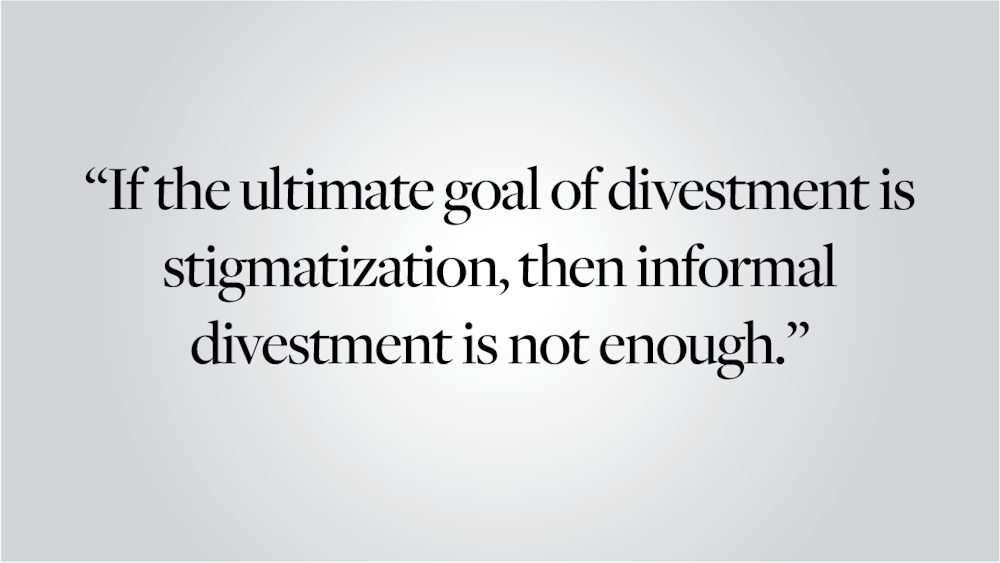Divestment is not a new topic to many American colleges and universities. It first disrupted American campuses in the 1970s and 80s as students protested companies involved in South Africa’s apartheid regime. Many of today’s students likely recognize the current fossil fuel divestment movement, which has seen several successes since its inception in 2012. However, there is a different divestment movement that has gained significant traction over the past few months, especially on Brown’s campus: the movement to divest from companies complicit in the Israeli occupation of Palestine and the current destruction of Gaza.
Since Hamas killed 1,200 Israelis during the devastating Oct. 7 attacks, Israel’s brutal retaliatory siege on the Gaza Strip has drawn fierce criticism from students across the country, and Brown is no exception. Last semester, pro-divestment student activists — myself among them — staged two separate sit-ins at University Hall, resulting in a total of 61 arrests. The current semester has already seen an eight-day hunger strike and several demonstrations. But President Paxson continues to refuse to bring a divestment proposal to Brown’s governing body and the public at large questions the effectiveness of divestment. We must understand what the divestment movement hopes to achieve — and why it should succeed.
Let’s get this out of the way early: Divestment does not substantially impact the market value of targeted companies. However, those who use this fact as an argument against the divestment movement are missing the point. The goal of divestment is not to completely tank the companies implicated in these human rights violations. The divestment movement has many goals, and each of them can have meaningful consequences that go far beyond any decline in shareholder value.
Firstly, divestment is a clear campaign goal. Israel’s apartheid regime, much like the former apartheid regime in South Africa, is a complex system in a faraway country supported by a web of various political and economic interests. It is a difficult beast to tackle. Divestment offers a focal point for student campaigns, and with each divestment proposal that makes it to a vote, the movement is reinvigorated.
With a solid campaign goal and a clearly defined movement, activists can work toward their next goal: spreading awareness. Simply put, an issue will not be addressed if no one knows about it. As students organize around divestment, they bring attention to the many ways — financial and otherwise — that their institutions support and uphold certain injustices. Student activists may even hold teach-ins, invite guest speakers and create educational materials to educate the public. This type of peer education is essential for building public pressure, especially as conversations of divestment may open up discussions about other types of financial or economic sanctions.
This leads us to the last goal of the divestment movement: stigmatization. As the complicity of various companies in human rights violations is brought to light and subsequently shamed, a social and political stigma is created around associating with institutions inflicting these abuses. Even if this does not directly influence corporate behavior, it may eventually compel governments to act. As more people became aware of the evils of South African apartheid, pressure mounted for American politicians to respond. Though Cold War-era politics had many politicians wary of cutting ties with the anti-communist apartheid government, the public pressure eventually became too much, and Congress passed the Comprehensive Anti-Apartheid Act. The bill’s economic sanctions, in addition to the resulting exodus of multinational corporations from South Africa, created a massive financial burden that contributed to the eventual fall of the apartheid regime.
Though they were slow on the uptake, Brown’s leaders eventually also took action. In 1987, the Campus Committee on South Africa wrote, “It is apparent to all of us that a far more important impact of divestment than its direct economic effects … is its indirect communication of our seriousness of purpose to the US Government”
Unfortunately, the University’s current leaders have forgotten the lessons learned by their predecessors. In response to recent demands for divestment, the Investment Office has claimed they informally do not invest in the weapons manufacturers identified as divestment targets by the Brown Divest Coalition, a claim impossible for community members to verify due to the endowment’s opaque nature. But more importantly, this claim does not absolve the Brown Corporation of its duty to publicly commit to abstaining from future investments in companies profiting off of Israel’s human rights abuses. If the ultimate goal of divestment is stigmatization, then informal divestment is not divestment that works.
Divestment might not seem like much, but we are in the early days of this anti-apartheid divestment movement. So far, the only American college or university to divest from the occupation of Palestine is the small liberal arts school of Hampshire College. Hampshire College was also the first American school to divest from South African apartheid in 1977; seldom does our hindsight offer such clear direction for the future.
History has shown us that the seemingly dull sword of divestment is a powerful weapon in the fight against grave injustice, and it is the most powerful tool Brown has as an academic institution. So let us wield it.
Isabella Garo ’24 can be reached at isabella_garo@brown.edu. Please send responses to this opinion to letters@browndailyherald.com and other op-eds to opinions@browndailyherald.com.





